
Nikolaus Herman was a German Lutheran cantor and teacher, creating numerous Protestant hymns. Some of them are contained in hymnals in several languages.

Gotteslob is the title of the hymnbook authorized by the Catholic dioceses in Germany, Austria, South Tyrol, Luxembourg and Liège, Belgium. First published in Advent 2013, it is the current official hymnal for German-speaking Catholics, succeeding the first common German hymnal, the 1975 edition of the same name. Each diocese published a book containing a common section and a regional section. The first editions amounted to around 4 million copies.
"Der Geist des Herrn erfüllt das All" is a Christian hymn for Pentecost by Maria Luise Thurmair, written in 1941. First printed in 1946, it appeared with a 1609 melody by Melchior Vulpius in the German Catholic hymnal Gotteslob in 1975 as GL 249. It has been included in ecumenical hymnals and songbooks.
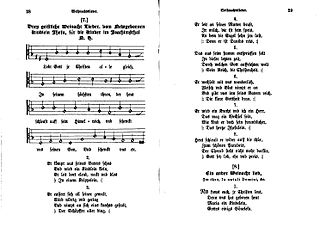
"Lobt Gott, ihr Christen alle gleich" is a German Christmas carol with lyrics and melody by Nikolaus Herman. It is part of Protestant and Catholic hymnals, has inspired musical settings, and has been translated. The title is also known as "Lobt Gott, ihr Christen allzugleich".
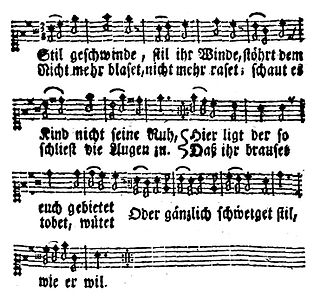
"Erde, singe" is a German Catholic hymn with a text by Johannes Cardinal of Geissel, Archbishop of Cologne, written in 1837 as a Christmas carol in ten stanzas. The current Catholic hymnal Gotteslob has only four stanzas as GL 411, which are in the general section of praise.
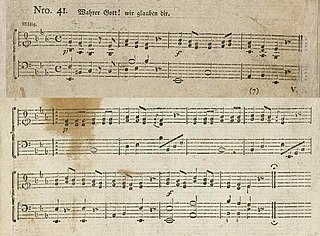
""Wahrer Gott, wir glauben dir" is a Catholic hymn. Christoph Bernhard Verspoell (1743–1818), a cleric from Münster, wrote text and melody, and published it in 1810 in his hymnal Orgelbegleitung zu den Gesängen beym Römisch-kathol. Gottesdienste. Herausgegeben von C. B. Verspoell. The song in two stanzas has remained in the repertory of church hymns, used mainly during Eastertide, but also for communion and funerals. It appears in several regional sections of the Catholic hymnal Gotteslob, as GL 770 in Cologne, as GL 780 in Limburg and Münster, and as GL 783 in Speyer, among others.
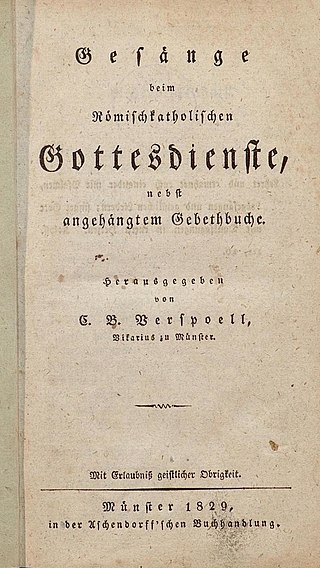
Christoph Bernhard Verspoell was a German Catholic priest, writer and hymnwriter. He published a hymnal with added melodies and organ settings in 1810. Some of his songs are still popular and part of the Catholic hymnal Gotteslob.
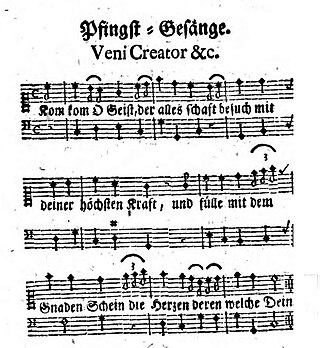
"Komm, Schöpfer Geist, kehr bei uns ein" is a Christian hymn in German for Pentecost. The text is a paraphrase of the Latin hymn Veni Creator Spiritus by Heinrich Bone. The melody is an adaptation of the Latin hymn's plainchant. It was first published in 1845. In the Catholic hymnal Gotteslob, it is GL 351.

Cantate! (Sing!) is a German Catholic hymnal first published in 1847, and continued in seven editions until 1879. It was a collection of 444 old and new songs, edited by the educator and hymnwriter Heinrich Bone, and the first Catholic hymnal in German that was used in multiple dioceses. Several of the songs are still part of the common Catholic hymnal in German, Gotteslob.
"Solang es Menschen gibt auf Erden" is a Christian hymn with German text by Dieter Trautwein, translating a 1969 Dutch hymn by Huub Oosterhuis, "Zolang er mensen zijn op aarde". The song, of the genre Neues Geistliches Lied (NGL), is part of German hymnals and songbooks.

"Macht weit die Pforten in der Welt" is a Christian hymn with German text by Albert Knapp written for the Basel Mission and first published in 1829. It appeared in 19th-century German hymnals, to be sung with the melody of "Wie schön leuchtet der Morgenstern". It appeared in the 1938 hymnal Kirchenlied with a new melody by Adolf Lohmann. The song is part of the 2013 German Catholic hymnal Gotteslob.
"Erfreue dich, Himmel, erfreue dich, Erde" is a Christian hymn in German. The current hymn, part of modern hymnals and song books, was written by Maria Luise Thurmair in 1963 as a Psalmlied based on Psalm 148 which deals with praise of God from his creatures. She wrote it using and expanding a short Christmas carol from the 17th century. She retained the first stanza completely and used its second half as a refrain. She also retained the old melody.
"Kündet allen in der Not" is a Christian hymn with German text by Friedrich Dörr written in 1971 to a 1662 melody by Johann Rudolf Ahle. The song is part of the German Catholic hymnal Gotteslob.
"Lobpreiset all zu dieser Zeit" is a Christian hymn in German for a new year with text by Heinrich Bone written in 1851. It is contained in the Catholic hymnal Gotteslob. It is sung to a melody that Martin Luther created in 1529.
"Manchmal feiern wir mitten im Tag" is a Christian hymn written in 1974 with German text by Alois Albrecht and a melody by Peter Janssens. The song, of the genre Neues Geistliches Lied (NGL), is part of German hymnals, including Gotteslob, and songbooks including ecumenical collections and books for young people. It begins: "Manchmal feiern wir mitten im Tag ein Fest der Auferstehung".
"Herr, gib uns Mut zum Hören" is a Christian hymn, with text and melody written in 1963 by Kurt Rommel. The song, of the genre Neues Geistliches Lied (NGL), is part of German hymnals, including Gotteslob, and of songbooks.

"Nahe wollt der Herr uns sein" is a Christian hymn with German text, translated in 1971 from a 1964 Dutch hymn by Huub Oosterhuis. Its refrain says that God is among people but not recognised. The song, of the genre Neues Geistliches Lied (NGL), appeared from 1975 in German hymnals, then in the common section of the Catholic Gotteslob. In the hymnal's second edition, it appeared only in regional sections.
"Ihr Christen, singet hocherfreut" is a Christian Easter hymn. The German text was adapted by Christoph Moufang in 1865 from the 15th-century Latin hymn "O filii et filiae". It is sung to the same melody. Beginning and ending with a three-fold Halleluja, it is also known as "Halleluja – Ihr Christen, singet hocherfreut". The Latin "O filii" was translated into English by John Mason Neale as "Ye Sons and Daughters of the King" and appears in many English language hymnals.
"Öffnet eure Tore" is a Christian hymn in German, written by Christoph Bernhard Verspoell for the Feast of the Ascension. The text is based on Psalm 24. While the text was written in Münster in 1810, the melody was composed for a Trier hymnal of 1846. It became part of the regional sections of the German Catholic hymnal Gotteslob.

"Fest soll mein Taufbund immer stehn" is a Catholic hymn in German, with text by Friedrich Matthias Berghaus. Originally in four stanzas, it was included in Christoph Bernhard Verspoell in his hymnal, first in 1810 and again in 1829. The melody was composed by Chrysanth Joseph Bierbaum, published in Bonn in 1826.












